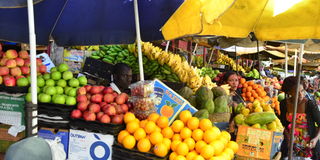Covid-19 crisis: Fresh foods business more challenging

Market vendors wait for customers to buy fresh foods. Covid-19 affected the demand for fresh foods both locally and internationally. PHOTO | DOMINIC BUKENYA
In a bid to combat further spread of Covid-19, government imposed a nationwide lockdown.
After hearing the news of the lockdown, many people rushed to buy and stock dried foods as a food security measure. This affected the demand for fresh foods both locally and internationally.
Those in the export business, the pinch was too deep. Their chains of supply where disrupted as there were no direct flights to transport their products to, especially European market. Those who wanted to export, their produces would pass through Kenya to the final destination. This caused more delay,s which resulted into some of the fresh foods to get rotten before reaching the final destination.
Speaking as a panelist in a discussion organised by Absa Bank Uganda on agribusiness opportunities and challenges amidst Covid-19, Mr James Kanyije, the managing director KK Fresh Produce Exporters Ltd, said fresh foods producers have not been helped during the lockdown.
“We need direct flights for our products. These are fresh products that need to reach the destined markets on time. The business of our perishables going from one destination to another before the final destination causes more losses. We invest money to transport our produces to foreign markets and when produces do not reach the final market to be sold, then we are not making any returns on investment,” Mr Kanyije said.
He said many fresh food dealers lack facilities that can keep their products safe for a long period of time.
Government through Uganda Development Bank (UDB) introduced the Agriculture Credit Facility where it provided financial help of Shs10b to the farmers. However, Mr Kanyije said this money cannot accommodate all the farmers, especially those on large scale.
“The maximum amount one can borrow is about Shs2.1b. This is very little for some of us doing agriculture on large scale. All we want is government to help us get market for our bumper harvests, improve on storage infrastructure and put in place post-harvest handling equipment,” he added.
Uganda, according to Mr Kanyije, has potential to increase on her agriculture exports but less is exported.
“Government should not paint a rosy picture of the sector, yet the reality on ground is we export less produce as compared to our neighbouring countries such as Rwanda and Kenya. If we are to help farmers benefit from agriculture the focus should be on how these farmers can elevate from farming on a small scale to a large scale,” he says.
Mr Mumba Kalifungwa the managing director Absa Bank Uganda, said their bank has only about Shs100b and this money is available for borrowing to farmers dealing in Coffee and tea.
“The sector is still considered risky and we want to move slowly on this”, Mr Kalifungwa said.


